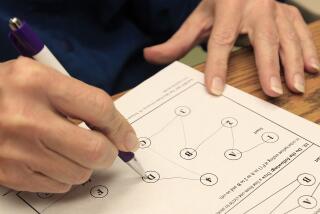Putting Psyches to the Test
- Share via
When I was a kid, my school would occasionally be visited by grown-ups who’d give us tests filled with multiple choice questions like: “When I have chocolate, I like to a) share it with my friends; b) give it to my teacher; c) mail it to starving children overseas; d) eat it all without sharing with anyone.”
One didn’t need to be a future rocket scientist to suspect such tests were probing the psyche, and I’m sure lots of us lied smarmily. Apologies if we messed up anyone’s doctoral thesis--though for all I know they were testing a Schoolchild Dishonesty Scale.
I recently decided to learn more about psychological testing. Little did I know that my inquiries would lead me, by the end of the day, to baring my own soul.
(Dramatic music goes here.)
There are thousands of psychological tests, say testing experts Harrison Gough (professor emeritus of psychology at UC Berkeley) and Robert Hogan (a psychologist in Tulsa, Okla.). The tests, listed in a hulking book called the “Mental Measurement Yearbook,” are seemingly of every stripe, examining smarts, psychopathology, personality, you name it. “Brief Test of Head Injury.” “Ego Function Assessment.” “Entrepreneurial Style and Success Indicator.” Want some “mind” thingy measured? Chances are there’s a test purporting to do it.
Which isn’t to say that all the tests are good: “They go all the way from frauds to the wonderfully established and carefully studied,” Gough says. Tests, after all, should be tested to show they measure what they claim to.
Good and bad, psychological tests have been around for ages. In the Bible (Judges 7:1), God selected soldiers based on whether they lapped water or drank it from cupped hands. The Chinese used personality tests in selecting government employees 2,000 to 3,000 years ago.
Modern-day testing is rooted in the mid-1800s. For instance, psychoanalyst Carl Jung used word association: A patient spat out responses to words at a rapid clip. (If he stalled for 15 seconds on “mother,” it was a tip-off that he might have hang-ups about his mom.)
War spurred on the psychological testing field. In World War I, the “Woodworth Personal Data Sheet” was devised at the U.S. Army’s behest to try to weed out soldiers prone to becoming mentally unhinged in the trenches.
And, during World War II, University of Minnesota researchers developed a famous questionnaire called the Minnesota Multiphasic Personality Inventory, which tested for a range of mental problems such as hysteria and depression. “It went all over the world almost instantly,” says Gough, who recalls it arriving at the Army hospital where he worked in 1943. A reworked version of the MMPI is still widely used today.
More recently, tests were developed (including one in 1954 by Gough and a more recent one by Hogan) to measure more normal variations in human personality. Things like levels of dominance or responsibility.
These are really important for job testing, insists Hogan: “If all you know about someone is that he’s not crazy, what do you know?” he says.
Perhaps you’re dealing with the kind of employee who works conscientiously. But perhaps he’s the kind who lazes around making pigs from erasers and push-pins pilfered from office supplies, like the one on top of my comput--... never mind.
*
In the spirit of experiential journalism, I got tested to see if I was in the right profession. (I’ve long feared that one day I’ll be outed as an impostor, tarred, feathered and fired.) Hogan, who with his psychologist wife, Joyce Hogan, runs Hogan Assessment Systems, sent me the “Hogan Personality Inventory.” And so I got to work answering true and false to statements such as, “My success depends on how others perceive me” ( Yes! But it shouldn’t! But it does! But it shouldn’t! ) and easier ones such as “I would enjoy skydiving.” (Not in this or any future lifetime.)
The written report came back, and--oh, joy--”You look like a journalist,” Hogan said. (This wasn’t necessarily a compliment: Among other things I scored as tense, moody, defensive and a tad self-obsessed.)
Based on my assessment, Hogan strongly cautions me against jobs in law enforcement, long-distance truck-driving, accounting, the tracking of satellites from far-flung outposts like Greenland, and air traffic control. The world should be grateful for his words.
*
If you have an idea for a Booster Shots topic, write or e-mail Rosie Mestel at the Los Angeles Times, 202 W. 1st. St., Los Angeles, CA 90012, rosie.mestel@latimes.com.


